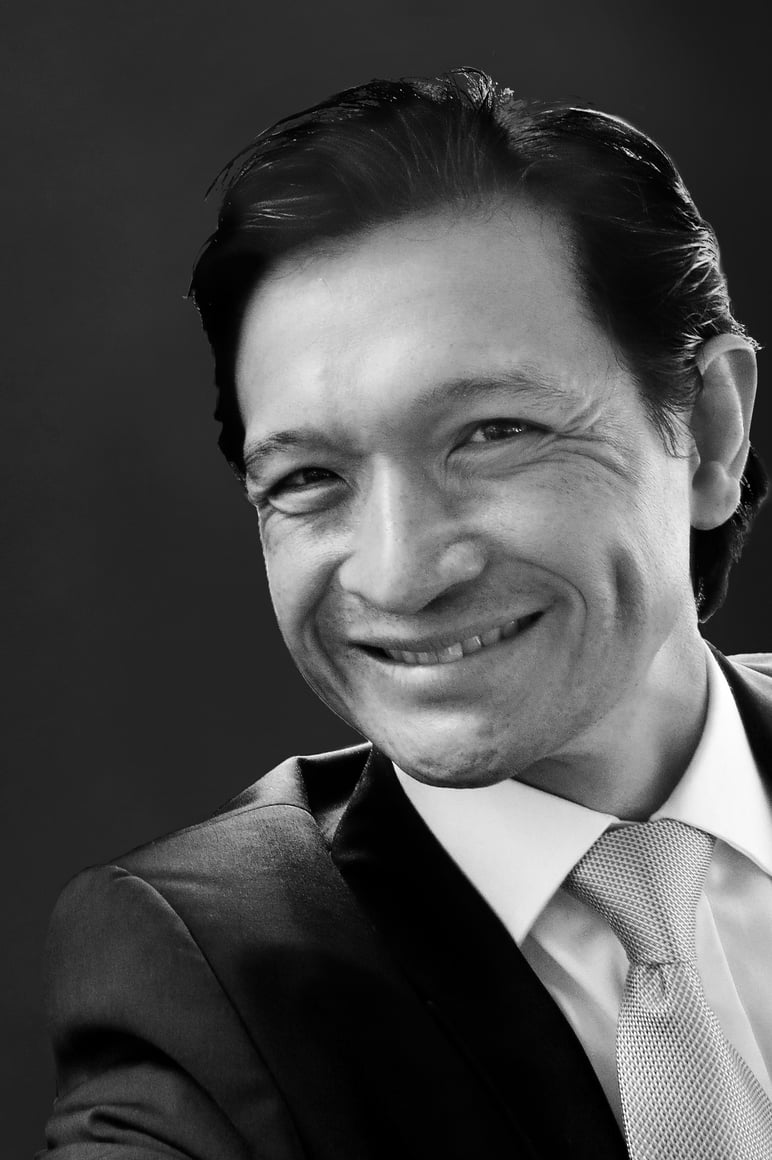
A Bubble Tea Summit brings together pro-Hong Kong and pro-China protesters in Vancouver
- The rivals sat together for almost three hours, trying to understand how the other came to such wildly different views about Hong Kong’s protests to their own
- Their conversation shows how personal and family histories cast the same events during the unrest in very different light
Fenella Sung sits across from Victor Feng at a narrow bench table at Bubble Queen on Vancouver’s Oak Street.
She’s nursing a hot rose jasmine tea – a somewhat radical choice in a bubble-tea joint – but it’s “fantastic”, she assures Feng, who sips a cold milk tea with tapioca balls, the classic variant of the genre.
“I like to keep things simple,” he says.
Three weekends earlier, they had faced each other under very different circumstances in this Canadian city that has 188,000 mainland-Chinese immigrants, more than 71,000 from Hong Kong, and all the tensions that implies.
Sung, 61, a long-time pro-democracy campaigner, was among the black-shirted activists rallying in sympathy with the Hong Kong protest movement.
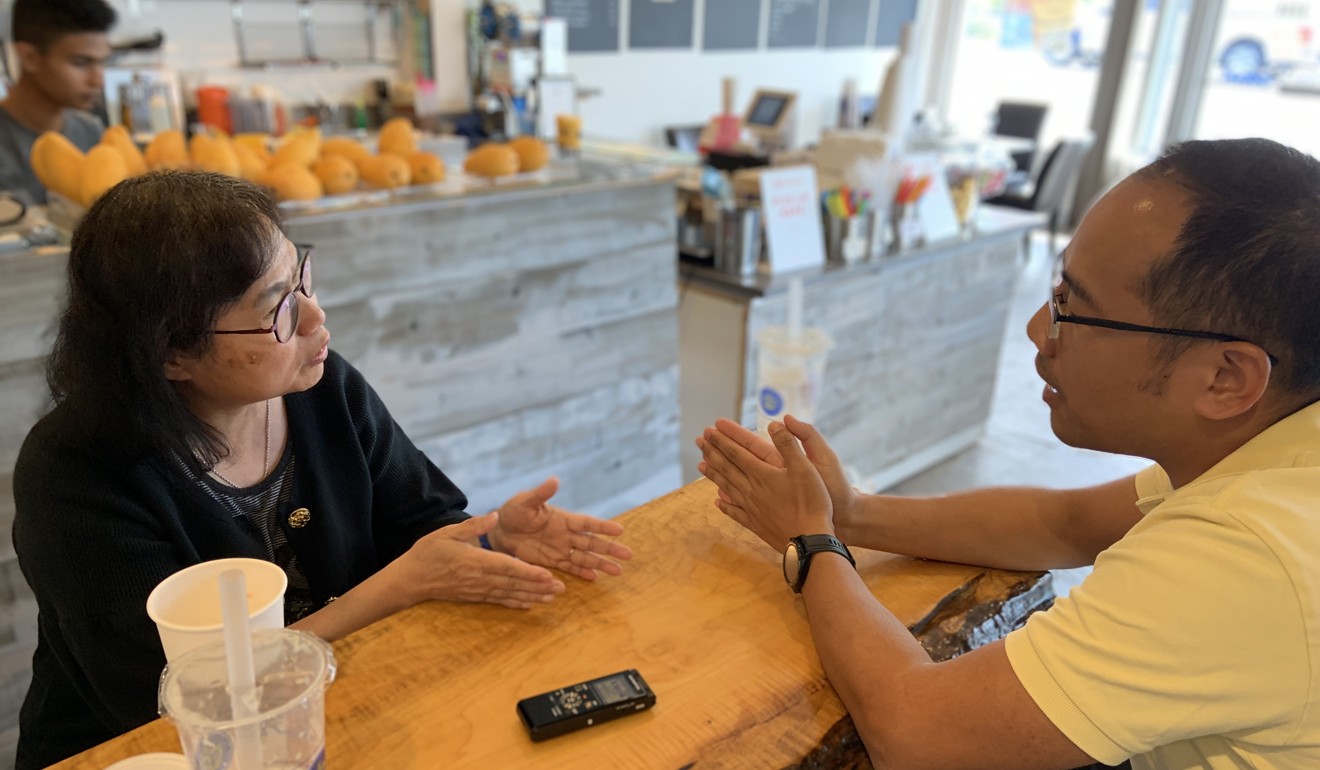
They were met by large crowds of pro-China counterprotesters, including Feng, who works in finance. He paid for Chinese flags waved at a series of events that weekend.
For almost three hours we sit at Bubble Queen, untangling the Rashomon effect of how Feng and Sung each arrive at such wildly different interpretations of what is happening in Hong Kong, and what is at stake.
Those journeys begin not with events since June, but with their personal and family histories, decades past, and the events that forged modern China and Hong Kong.
Pro-China camp questioned by Vancouver police over gun, machete ‘threats’
Feng, 34, tells us of the death of his great-grandfather at the hands of Japanese occupiers, and his pride in the rise of China that has paralleled that of his own family, from poverty to prosperity. “We’re proud that we stood up again,” he says.
Sung, a former RTHK journalist, tells of her family’s suffering under the Cultural Revolution and Communist rule, and their subsequent flight to the British colony. “As soon as my parents moved to Hong Kong, they made a very definite decision to separate themselves from that China,” she says. She feels not a speck of patriotism for Communist China.

They discuss various incidents during the unrest – the attack on protesters in Yuen Long by men in white shirts, the police storming of a train at Prince Edward MTR station. They agree on the basics of what they saw, but never come close to consensus on the context or implications.
There is no shoving or shouting. But the tension sometimes makes for an awkward afternoon.
Vancouver’s Hong Kong protesters think they’re being watched. They’re right
They talk of the rowdy encounter between their own rival protest camps in mid-August outside Vancouver’s Broadway train station, where pro-China activists first appeared en masse, in a show of numbers to challenge the Hong Kong side that surprised Feng himself. There was no violence, but there were raised middle fingers and angry taunts. Ferraris draped in Chinese flags revved past the protest site, as police kept the two sides separated.
Sung bristles at the memory.
“We were called traitors by your side,” says Sung. “Traitors to whom? We are Canadians. Who are we betraying?”
Feng responds that if he sees “someone on the street or across the table, all I can see is their appearance. I see someone that resembles a Chinese, I’m going to assume they are Chinese.”
Chinese patriotism, forged in Canada
The South China Morning Post invited Feng and Sung to sit down together last week in the wake of a series of flashpoint protests and counterprotests in Vancouver – at Broadway station, outside the Chinese consulate and, most controversially, outside a church hosting prayers for Hong Kong. All took place on the weekend of August 17 and 18.
The Broadway and consulate events devolved into sometimes angry shouting matches. At the pro-China protest outside the Tenth Church, Vancouver police escorted worshippers through dozens of people waving Chinese flags, some taking photographs of the Christians.

Sung, who moved from Hong Kong to Vancouver in 1991 and is convenor of the group Canadian Friends of Hong Kong, has helped promote protest events but prefers to call herself an “active supporter” rather than an organiser.
Feng likewise denies organising the pro-China protests, although he paid for flagpoles and flags waved by his camp, distributed bottled water and spoke to police and the media on the group’s behalf.
In contrast to Sung’s years of democracy advocacy, Feng – who moved to Vancouver as an international student 15 years ago – said it was the first time he had been involved in a protest movement. He was inspired after visiting Hong Kong and Guangzhou in July. “It’s kind of infuriating,” he said of the unrest.
Montreal Pride expels gay Hong Kong marchers, after ‘pro-Communist threats’
He immediately harked back to “racial slurs” used by Hongkongers to describe mainland people when he was a child.
Sung nods. “Like the Shanghainese and the Beijingese,” she says. But Hong Kong people, she agreed, once held themselves apart and above many others. “Not just across the border [in China]. Hong Kong people generally, because of the international background, and higher levels of education … they looked down on most people. But that has changed over the decades.”

They are both curious about each other; Feng praises Sung’s long journalistic resume that includes reporting on the mainland just after the signing of the Sino-British Joint Declaration on Hong Kong in 1984, and the drafting process of the Basic Law, Hong Kong’s mini-constitution. Sung expresses wonder at the rise of Feng’s family – both his parents became medical doctors in the first intake of students after the Cultural Revolution.
She asks him about the lard Feng still sometimes mixes with rice, a nostalgic treat that recalls a Guangzhou childhood during which his parents could not always afford meat. “Lard, soy sauce and rice …. that was really the best,” he says, smiling at the memory. Today you can get lard for free from a shop at Crystal Mall in Burnaby, he tells Sung.
Feng says he feels equally Canadian and Chinese, but it is his Chinese patriotism that shines through, as well as what he thinks the Hong Kong protests represent – a separatist movement that is a threat to the country’s sovereignty and integrity.
Convoys of Ferrari-driving pro-China patriots rev up Canada protests
His patriotism towards China grew after arriving in Canada in 2004, to study business at Simon Fraser University.
“Before I arrived in Canada I’m one of those people who love China, but I don’t love Communist China. That’s [the same for] a lot of people I talk to one our side, before they came out to Canada,” he said.
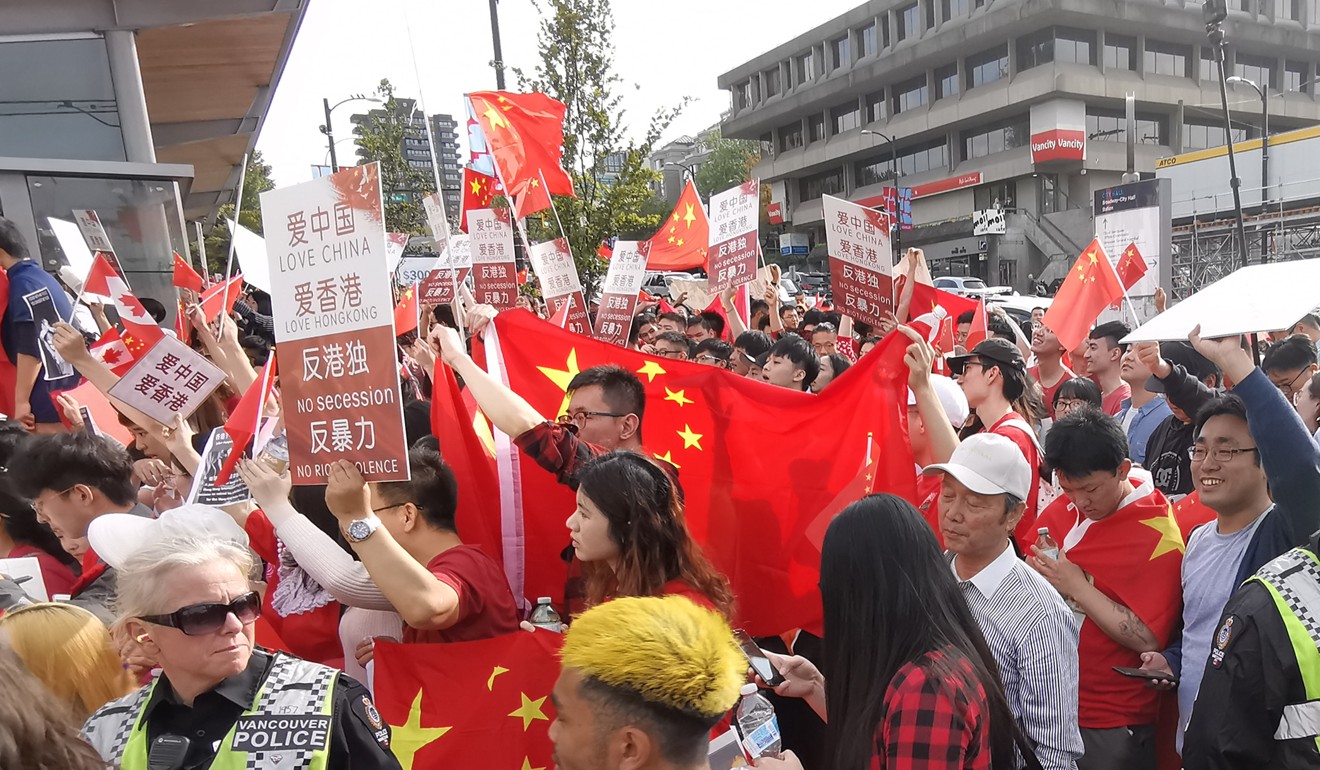
He says negative news and views about China in Canada had aroused in him concerns about bias, that in turn reinforced feelings of patriotism. “There’s a lot of misinformation about China that goes around,” he says.
I say it seems ironic that the longer he has spent in Canada the more patriotic towards China he has become, and that might surprise non-Chinese Canadians. “But that is correct” and quite typical, he says.
Sung says she has “never been patriotic towards Communist China ever in my life. Never. Otherwise I wouldn’t have left Hong Kong.”
“That makes me feel sad,” says Feng, and it sounds like he means it.
‘Blacklisted and unfriended’
For the record, Feng says he is not a Chinese spy.
Nor is his family being threatened back in China, and nor is he being paid by the Chinese consulate, he says. All are allegations made since Feng took on a public role in the counterprotests.
“I find it laughable. I mean, I wish I was getting paid,” he says, and Sung laughs too. “But this is volunteer work. I spent money out of my own pocket for supplies.”
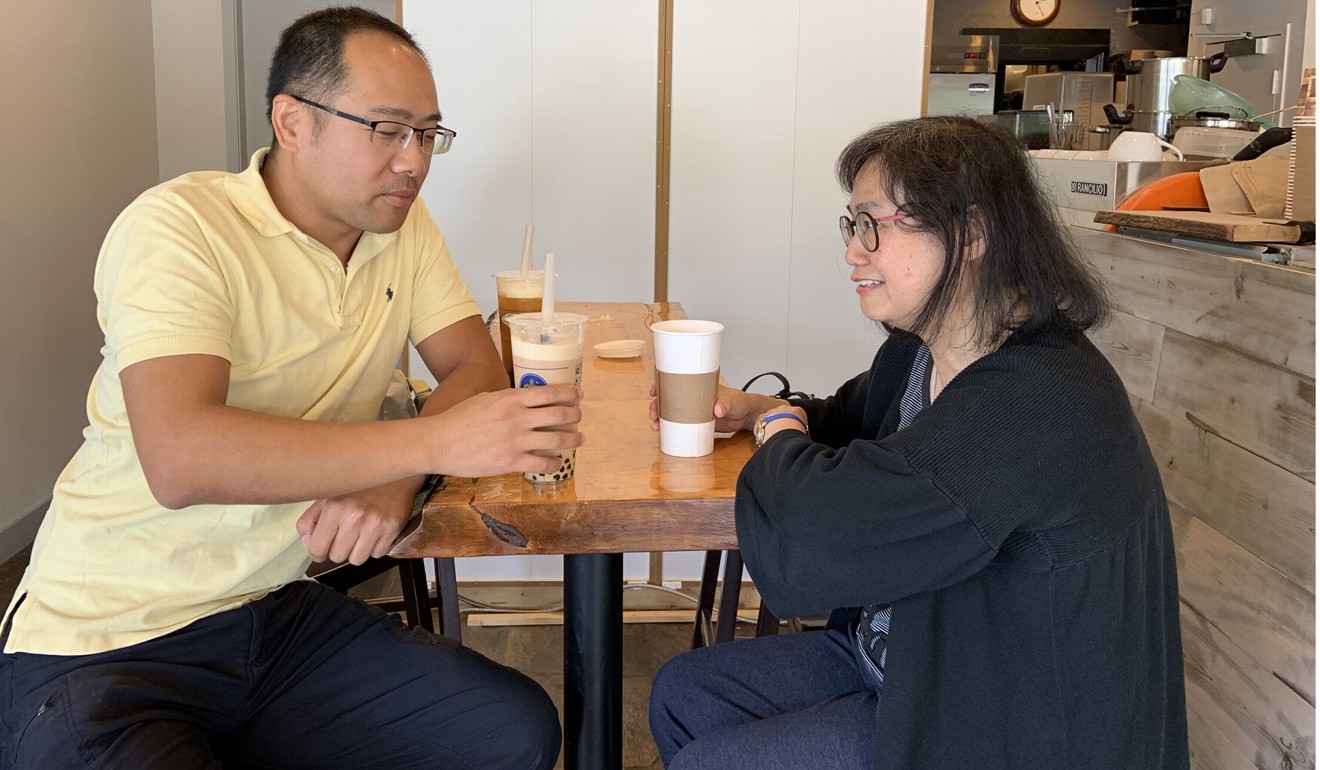
He also denies having ever communicated about the protests with the consulate – which last month issued a statement in support of the counterprotesters for targeting the “sin of Hong Kong independence”.
Instead, Feng says he is simply patriotic, and he feels strongly that the Hong Kong protests are a “family issue”.
“We don’t need to burden Canadians or the international community about what’s going on,” he says.
Sung, frowning, asks Feng whether he sees her and fellow protesters as Canadians – or as Chinese “airing dirty laundry”?
Pro-China protesters surround Vancouver church hosting Hong Kong prayers
It’s an important point. “I see them as Chinese,” says Feng, adding that the “consensus” among his non-Chinese friends is “we don’t really care. This is happening in China … It’s nothing to do with us.”
If that was a true, said Sung, it was a mistake. “What is happening in Hong Kong today could happen in Canada tomorrow. We see the CCP infiltration happening in Australian cities, in Canadian cities. That is what we are going to have to fend off.”
Feng laughs again and shakes his head, though this time Sung doesn’t seem to see the joke. “I want to say I am pro-CCP China, right here, now,” says Feng.

But both smile when asked if they have friends in the opposite camp. “Oh yeah, I did have,” says Feng with a weary grin. “Lots of them. I got blacklisted and unfriended [on social media by] young Hong Kong immigrants, friends in real life. But the close circles of friend are generally more aligned with my views.”
He says he ended up deleting his Facebook and Twitter accounts.
Sung says she avoids tension by not talking about her activism with friends she knows disagree.
“Online, you seek people with similar views. But in real life, friends are your neighbours or whatever that you cannot choose in the same way … if you know they don’t agree, you don’t talk about that part of your life.”
Which brings us to another key issue: how do two intelligent people see events in Hong Kong in such starkly different ways?
We run through contentious events. Yuen Long? They agree they saw men in white shirts beating protesters on July 21. But Feng thinks it unfair to describe the white-shirted men as “Triads” or somehow aligned with the government. “You could probably also mention that they could be CIA agents. There are all kinds of possibilities …. all you have to say is ‘we are not sure about their identities’.”
Sung scoffs. She says she sees nothing wrong with such reporting, so long it is clear the descriptions amount to a suspicion. (Police told the Post that some of the men arrested after the incident had backgrounds with the 14K and Wo Shing Wo triads).
What about another flashpoint moment, at Prince Edward Station on August 31? Both sketch parts of the same incident similarly – people on the ground being struck by police batons – but Feng argues that “police have been sanctioned to carry out a certain amount of force … they can use reasonable force”, and he found it impossible to know what exactly occurred before or after that “partial footage”.
Sung shakes her head. “The police are authorised to use a certain kind of force … but you have young kids sitting on the floor, with their hands raised above them, and police still beating them on the heads …. If that person is already subdued, then additional force is just punishment, it is not subduing the person to perform your duties.”
Sung’s voice rises in agitation, and Feng listens quietly.
“Look at all the footage. Using that judgment nearly all circumstances we see are excessive force.”
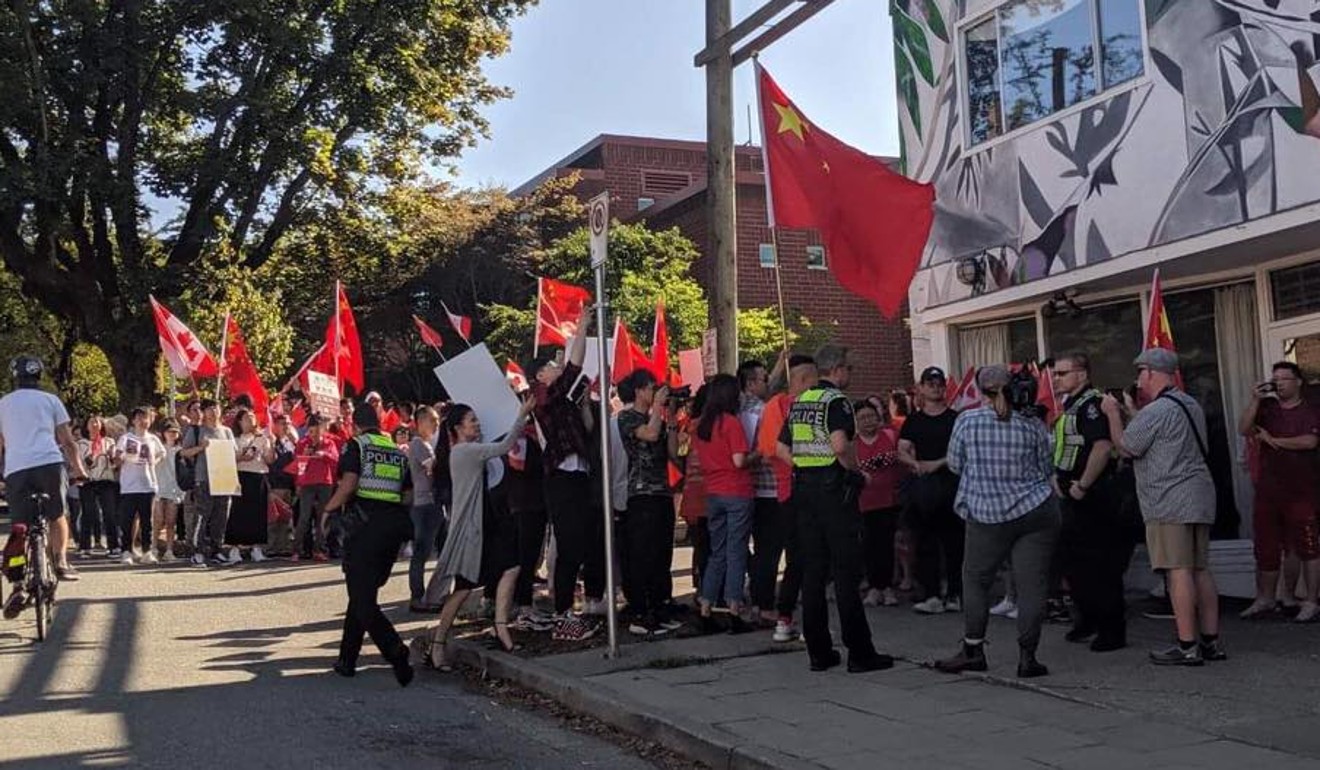
Overall, “Hong Kong police have demonstrated extreme restraint to handling the rioters”, says Feng.
They never come close to agreement on the rights and wrongs, on this or other moments from the unrest. Every incident is coloured by the prisms of their personal histories, and their understanding of the background stakes: Feng decries what he sees as separatism and violence by rioters, Sung is appalled by what she sees as police brutality and the erosion of Hong Kong’s way of life and liberties.
China first? Or the individual
Contention closer to home emerges when I raise the August 18 protest outside Tenth Church.
Feng says he had no idea beforehand that the prayer meeting was being held in a church. Sung was incredulous: “I don’t agree that it’s not obvious … The name of the place is the Tenth Church.”
“But we didn’t know that until we got there,” Feng says. “I tried to tell everybody who arrived after ‘you know what, this is not a political event any more, it’s inside a church.’”
He said he stayed outside the church only to inform new arrivals that they should leave.
“So why were you guys taking photos of everyone coming out of the church,” says Sun. “Why did you not stop [them] filming these poor elderly women?”
“I’m not in control of everybody,” says Feng. “I don’t know 99.9 per cent there. And there was picture taking on both sides,” he says, referring to the consulate protest earlier that day.
Picture-taking has emerged as one of the bigger points of tension between the two camps in Vancouver. What is its purpose? And, more broadly, what is the purpose of the pro-China counterprotest movement?
Sung thinks she knows.
“To suppress our voice,” she says. “That’s the first thing that came to my mind when I saw them.”
And the photo-taking is intended to intimidate protesters, she says, amid concerns the pictures might somehow be used by Chinese authorities against them.
Feng says the only goal of the pro-China protests was to paint a clearer picture of what was happening in Hong Kong.
He doubts it worked.
“I don’t think I’m going to protest [any more] … our original intention was more of an educational kind of thing,” he says. “I had conversations [at the protests] with the other side and I don’t think it’s going anywhere. We’ve been sitting here …” he looks at his watch “ … and I don’t see it going anywhere.”
Sung, though, says she will keep protesting as long as those in Hong Kong do so too.

By late afternoon Bubble Queen is filling up with school pupils and we stand to leave.
Was anything achieved?
At least, Feng and Sung say, they now understand how the other arrived at their points of view.
Feng says Sung did not experience the rise of China, in the journey to her personal perspectives. “I rode along with the nation, from being in poverty towards prosperity. You probably didn’t ride along with China the way I did,” he says.
“The other fundamental difference is that you are focused on individuality. For me, as a Chinese, a mainlander, the common ground for us is that our nation, the country, always comes first. Then the home, then individuality.”
Sung nods in agreement: “That’s the big difference,” adding, “to me, the individual comes first”.
Sung’s sees the Hong Kong protests as a reaction to the loss and the trampling of individual freedoms; Feng’s sees “selfish” behaviour with a society-wide cost. Yet both see themselves and their respective sides as making personal sacrifices for the greater good.
As we separate Feng says: “We’re done? No arguments. No foul language.”
Sung laughs once more. “It helps.”
The Hongcouver blog is devoted to the hybrid culture of its namesake cities: Hong Kong and Vancouver. All story ideas and comments are welcome. Connect with me by email [email protected] or on Twitter, @ianjamesyoung70.

